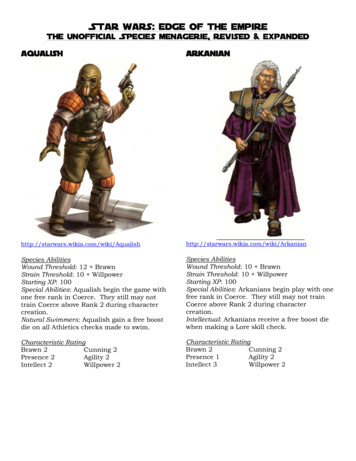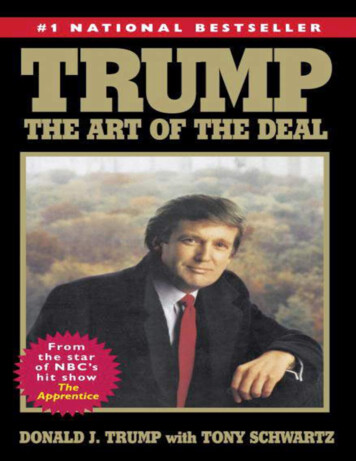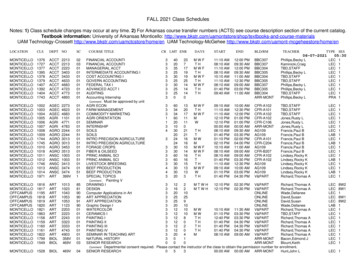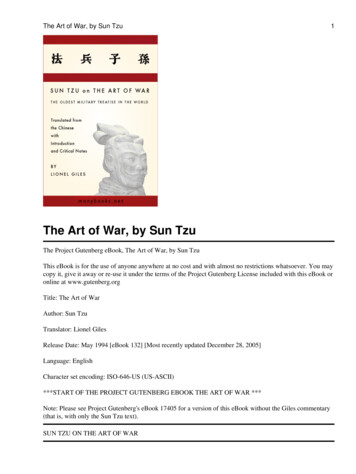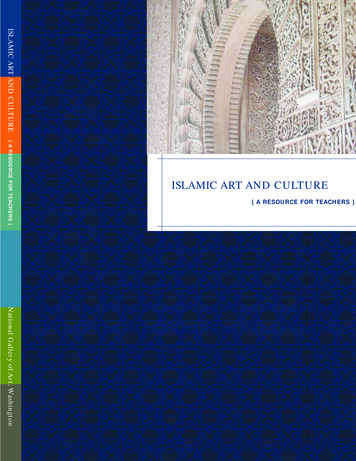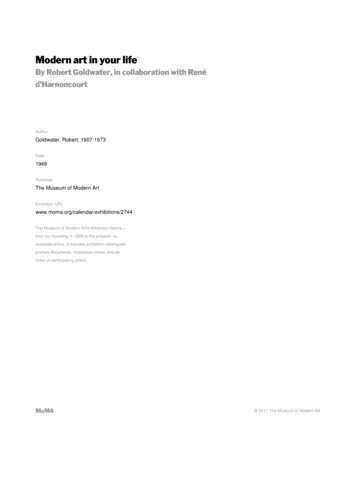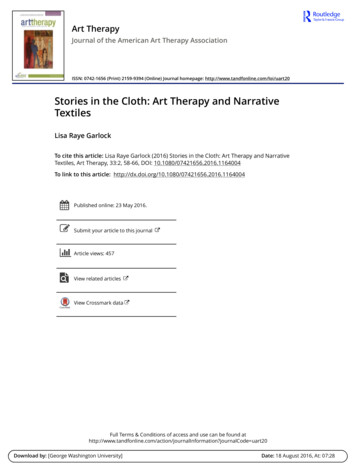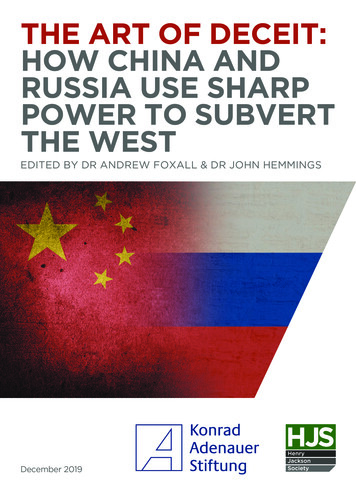
Transcription
THE ART OF DECEIT:HOW CHINA ANDRUSSIA USE SHARPPOWER TO SUBVERTTHE WESTEDITED BY DR ANDREW FOXALL & DR JOHN HEMMINGSDecember 2019
Published in 2019 by The Henry Jackson SocietyThe Henry Jackson SocietyMillbank Tower21-24 MillbankLondon SW1P 4QPRegistered charity no. 1140489Tel: 44 (0)20 7340 4520www.henryjacksonsociety.org The Henry Jackson Society, 2019. All rights reserved.Title: “THE ART OF DECEIT: HOW CHINA AND RUSSIA USE SHARP POWERTO SUBVERT THE WEST”Edited by Dr Andrew Foxall & Dr John HemmingsThe views expressed in this publication are those of the authors and are notnecessarily indicative of those of The Henry Jackson Society or its Trustees,or Konrad Adenauer Stiftung.Cover Photo: I mages from Chickenonline from g-prc-national-flag-asia-1184107/and Kaufdex from Pixabay OCRACY FREEDOM HUMAN RIGHTS
THE ART OF DECEIT:HOW CHINA ANDRUSSIA USE SHARPPOWER TO SUBVERTTHE WESTEDITED BY DR ANDREW FOXALL & DR JOHN HEMMINGS
THE ART OF DECEIT: HOW CHINA AND RUSSIA USE SHARP POWER TO SUBVERT THE WESTCONTRIBUTORSNeil Barnett is founder and CEO of Istok Associates, a London-based intelligence andinvestigation consultancy focused on Central and Eastern Europe, the Middle East, andAfrica. Previously, he was a journalist in the same regions for 13 years and wrote forThe Telegraph, The Spectator, and Jane’s publications. He covered the war in Iraq, theUkrainian Orange Revolution, the eastern expansion of NATO and the EU in the 2000s,and Balkan organised crime. He is a contributor to the Atlantic Council and the FreeRussia Foundation.Dr Andrew Foxall has been Director of the Russia and Eurasia Studies Centre at the HenryJackson Society since 2013 and in 2017 became Director of Research. Previously, he heldacademic positions at the University of Oxford and Queen’s University Belfast. Andrew’sresearch focuses on economic, political, and security trends in Russia and the formerSoviet Union. He is the author of Ethnic Relations in Post-Soviet Russia (Routledge, 2014)and is a frequent contributor to international newspapers and magazines including TheNew York Times, The Times, The Telegraph, Foreign Affairs, and Foreign Policy. Andrewholds a DPhil from the University of Oxford.Andrew Hastie MP is a member of the Australian Parliament, representing the electorateof Canning in the House of Representatives. Hastie was educated at The Scots College,Sydney (2000) before completing a BA (Hons) in History and Philosophy through theUniversity of New South Wales at the Australian Defence Force Academy. In 2006,he graduated officer training at the Royal Military College, Duntroon. Hastie resignedhis commission in 2015 to successfully contest a by-election in the seat of Canning forthe Liberal Party of Australia. He was re-elected in the general elections of 2016 and2019. Since 2017, Hastie has served as Chair of the Parliamentary Joint Committee onIntelligence and Security. His work has focused on espionage and foreign influence.Noteworthy legislation passed during his Chairmanship has included the Espionage andForeign Interference Act (2018), the Foreign Influence Transparency Scheme Act (2018),and the Security of Critical Infrastructure Act (2018).Dr John Hemmings is an Associate Fellow with the Henry Jackson Society’s Asia StudiesCentre and a faculty member of the Daniel K. Inouye Asia-Pacific Center for SecurityStudies (a US Department of Defense regional centre), where he carries out defencestudies on regional security issues. He also holds adjunct fellowships at the Centre forStrategic and International Studies (CSIS) and the Pacific Forum. Previously, he workedon Asian security for the Royal United Services Institute (RUSI). He writes in his personalcapacity.Matthew Henderson is Director of the Henry Jackson Society’s Asia Studies Centre. Hestudied Chinese language and culture for eight years at the Universities of Cambridge,Peking, and Oxford (1978–86) before joining the Foreign and Commonwealth Office fornearly 30 years’ service as a diplomat, during which China and East Asia figured largely.He worked in Hong Kong and China for a total of nearly seven years. From the early1970s to the present he has extensively studied China’s political, religious, and socialdevelopment, including evolving concepts of the interplay between state and individual,China and the rest of the world, and the nature and aims of warfare.2
THE ART OF DECEIT: HOW CHINA AND RUSSIA USE SHARP POWER TO SUBVERT THE WESTJakub Janda is Director of the European Values Center for Security Policy, based inPrague. He specialises in the response of democratic states to hostile disinformationand influence operations. He is Associate Fellow at Slovak Security Policy Institute andregular contributor to the Atlantic Council. He serves a member of Editorial Board ofexpert portal AntiPropaganda.sk and is a member of Active Reserves of the Czech ArmedForces. In 2016–2017, he was tasked by Czech security and intelligence institutions toconsult on the ‘Influence of Foreign Powers’ chapter within the Audit of National Securityconducted by the Czech government, where he was involved in the Czech policy shift onthis issue. Since 2019, he serves as a member of the Programming Board of the CentreAnne de Kyiv.Lucrezia Poggetti is a Research Associate in the Foreign Relations team at the MercatorInstitute for China Studies (MERICS) in Berlin. Her research focuses on Europe-Chinarelations, including China’s sub-regional diplomacy and the Chinese Communist Party’spolitical influencing efforts in Europe. Prior to joining MERICS, she gained professionalexperience at the Delegation of the European Union to China working on Chinese domesticpolitics. Poggetti holds a Master’s degree in Chinese Studies from the School of Orientaland African Studies (SOAS) and has spent one year at Zhejiang University in Hangzhoustudying Mandarin.Didi Kirsten Tatlow is a Senior Fellow at the German Council on Foreign Relations. AHong Kong-born journalist, she has worked in Asian, European and American media since1994, including the South China Morning Post, Die Welt, Deutsche Welle, The AssociatedPress and, until 2017, The New York Times. After leaving China that year with her family,she completed a fellowship at the Mercator Institute for China Studies (MERICS) in Berlin.A graduate of the University of London’s School of Oriental and African Studies, sheis married to the Irish journalist Clifford Coonan. They have two children and a Beijingbulldog.Veronika Víchová is Head of the Kremlin Watch Program at European Values Center forSecurity Policy, based in Prague. She graduated from the Masaryk University in Brno,Czechia. She compiles the Kremlin Watch Briefing, a weekly newsletter on disinformationand influence operations for more than 7,000 European experts, journalists, and officials.She has co-authored a study on how Kremlin propaganda portrays European leaders,which was published by the Atlantic Council. She participated in the TransatlanticFellowship Program in Washington DC organised by the World Affairs journal, whichshe spent at the office of Senator Rob Portman. She graduated from the New SecurityLeaders Program in 2017.3
THE ART OF DECEIT: HOW CHINA AND RUSSIA USE SHARP POWER TO SUBVERT THE WEST4
THE ART OF DECEIT: HOW CHINA AND RUSSIA USE SHARP POWER TO SUBVERT THE WESTCONTENTS CONTRIBUTORS2INTRODUCTIONDr Andrew Foxall & Dr John Hemmings51. THE TRIPOD: RUSSIA’S POLITICAL WARFARE WEAPONNeil Barnett102. CHINA’S GROWING POLITICAL INFLUENCE IN ITALY:A CASE STUDY OF BEIJING’S INFLUENCING TACTICS IN EUROPELucrezia Poggetti143. RUSSIA’S MANIPULATION OF EUROPEAN MEDIAJakub Janda & Veronika Víchová204. “TELL THE CHINESE STORY WELL”:CHINA’S GREAT EXTERNAL PROPAGANDA IN EUROPEDidi Kirsten Tatlow255. RUSSIAN SHARP POWER IN EUROPEAN ACADEMIADr Andrew Foxall316. VICTORY WITHOUT A FIGHT:CHINA’S SHARP POWER IN UK ACADEMIAMatthew Henderson357. WHAT IS TO BE DONE?Andrew Hastie MP39ACKNOWLEDGEMENTS43ABOUT US435
THE ART OF DECEIT: HOW CHINA AND RUSSIA USE SHARP POWER TO SUBVERT THE WEST6
THE ART OF DECEIT: HOW CHINA AND RUSSIA USE SHARP POWER TO SUBVERT THE WESTINTRODUCTIONDr Andrew Foxall and Dr John HemmingsIn the immediate aftermath of the Cold War, liberal democracy seemed to be in theascendency while communist authoritarianism appeared to have been consigned to the‘dustbin of history’. Over the last decade or so, however, it is authoritarianism, ratherthan democracy, that has been in the ascendency, with ruling elites in China and Russiacentralising power inside their borders and exporting their norms and behaviour into therules-based international system.Defined by top-down authoritarianism and crony-capitalism, the two states haveconsolidated power under strongmen-style leaders, Xi Jinping and Vladimir Putin. In theprocess of challenging the international order over the last two decades, both leadershave carried out ever-increasing acts of political warfare against the West. For China,the template for subverting one’s enemies can be found in Sun Tzu’s “winning withoutfighting” principle,1 in addition to the “Three Warfares” concept described in a seminal1999 People’s Liberation Army’s (PLA) book, Unrestricted Warfare.2 Such writings havebeen given pride of place in Xi’s promotion of the United Front Work Department, one ofthe ‘magic weapons’ of the Chinese Communist Party. For Russia, much has been madeof the writings of General Valerii Gerasimov, Chief of the General Staff of the RussianArmed Forces, since 2013, but the Kremlin’s contemporary tactics are similar to those itemployed during the Cold War.3What is meant by ‘political warfare’? The term encompasses a wide range of domesticand international instruments that have historically been used to persuade, intimidate,undermine, coerce, and weaken opponents, all in the effort of achieving desired politicalgoals. It also includes economic warfare, cyber warfare, and many other forms of warfareshort of conventional military combat. Within this, as China and Russia are claiming largerroles on the global stage they are devoting increasing amounts of effort and money toshape international public opinion. While such efforts cannot be considered ‘soft power’due to their state-driven functionality, they are not exactly ‘hard power’ in the openlycoercive sense either. Nor are they public diplomacy, since their modus operandi is towork behind the scenes, covertly.In this context, the National Endowment for Democracy scholars Christopher Walker andJessica Ludwig coined the term “sharp power” as the attempts to pierce or penetratethe political and information environments of targeted countries.4 While there has muchdebate over recent years as to whether sharp power is substantively different from softor hard power, we believe there is merit in the term as a distinct sub-genre of what washistorically called ‘influence operations’. The age of the internet and the pervasiveness ofthe digital space, combined with the internationalisation of Western media and business,have intensified the reach of authoritarian states in ways that simply were not possibleduring the Cold War. These developments give renewed importance to Henry Kissinger’s1 Sun Tzu, The Art of War (New York: Dover Publications Inc., 2002), p. 49.2 Qiao Liang and Wang Xiangsui, Unrestricted Warfare, translated by Foreign Broadcast Information Service (Beijing,China: PLA Literature and Arts Publishing House, February 1999), available at: f, last visited: 28 November 2019.3 Giles, K., ‘Russia’s ‘New’ Tools for Confronting the West: Continuity and Innovation in Moscow’s Exercise of Power’,Chatham House (2016), available at: ons/2016-03-russia-newtools-giles.pdf, last visited: 28 November 2019, pp. 11-12.4 Walker, C. and Jessica Ludwig, ‘From ‘Soft Power’ to ‘Sharp Power’: Rising Authoritarian Influence in the DemocraticWorld’, National Endowment for Democracy, December 2017, available at: ce.pdf, last visited: 28 November 2019.7
THE ART OF DECEIT: HOW CHINA AND RUSSIA USE SHARP POWER TO SUBVERT THE WESTobservation, made in 1955, that the “predominant aspect of the new diplomacy is itspsychological dimension”.5The situation is increasingly stark. China and Russia are well-equipped, experienced,and highly skilled at conducting political warfare operations, including sharp power.Through such operations they are actively working to undermine the core interests of theWest, seeking to subvert its cohesion, and attempting to erode the resilience of liberaldemocratic societies. In contrast to the Western bloc, which abandoned high-level politicalwarfare operations at the end of the Cold War, China and Russia have been undertakingoperations to achieve these goals for much of the last two decades. NATO memberstates in Europe – particularly those in the Baltics – have borne the brunt of Russianmeddling and mischief-making, particularly in the wake of cyber-attacks on Estonia in2007. Australia, New Zealand, Canada, and the United Kingdom are increasingly servingas testing grounds for intrusions into democratic political institutions and processes byChina and its surrogates.There is no set pattern or template for Chinese and Russian political warfare operations. Thestrength of this approach is that neither country relies too heavily on a single instrumentor series of instruments to achieve their goals; different instruments are combined andtheir mix is adapted to the requirements of each specific circumstance. This full spectrumapproach is mirrored in the relationships which the Chinese and Russian authoritiesseek to engender with individuals and organisations. Some are paid collaborators andagents, some are ‘fellow travellers’ sympathetic to the goals of the Chinese and Russianauthorities, and some are ‘useful idiots’ who – perhaps even for the most altruistic orinnocent of reasons – participate in Chinese- and Russian-backed activities and, in doingso, further the agendas of Beijing and Moscow.This report explores Chinese and Russian sharp power in three key pillars of Westernliberal democracies: pluralistic politics; a free media; and academia. It is based on a oneday, closed-door conference hosted by the Henry Jackson Society and Konrad AdenauerStiftung’s UK and Ireland Office in June 2019. The conference brought together academics,commentators, think tankers, policy experts, and officials from a range of Westerncountries, including the United States, Germany, the UK, Italy, Taiwan, and Australia. Theconference explored questions including: How deeply is the strategy and practice ofpolitical warfare held in China and Russia? What form does it take, and what instrumentsare used? How do these instruments differ across space and time? How much of a threatdoes Chinese and Russian political warfare ultimately pose to the West? And how can theWest increase its resilience in order to counter this? Some of the answers the conferenceprovided are contained in the essays that follow.As it proceeds, this report is divided into seven essays.The first two essays detail Russian and Chinese sharp power in the context of Europeanpolitics. The first essay, by Neil Barnett, focuses on the ‘tripod’ of Russian politicalwarfare instruments: disinformation and cyber; financial; and human. The second essay,written by Lucrezia Poggetti, describes China’s influence operations among Italy’s rulingelites and the nature of the challenge the operations pose to authorities in Rome. Acrossboth essays, the authors address the ways in which China and Russia have: created5 Kissinger, H. A., ‘Psychological and Pressure Aspects of Negotiations with the USSR’ in Psychological Aspects of UnitedStates Strategy, CIA (1955), available at: 69R000300120001-4.pdf, last visited: 28 November 2019, p. 170.8
THE ART OF DECEIT: HOW CHINA AND RUSSIA USE SHARP POWER TO SUBVERT THE WESTsympathetic lobby groups; funnelled money to political parties; generated good-willamongst politicians through seemingly non-political initiatives; and interfered withdomestic political processes.The third and fourth essays discuss Russian and Chinese political warfare in the contextof a free media. The third essay, by Jakub Janda and Veronika Víchová, discusses thegoals, key characteristics, and tools kits that Russia uses in Central and Eastern Europe.The fourth essay, by Didi Kirsten Tatlow, does this for Europe as a whole, describingthe raison d’être and successes of China’s ‘Great External Propaganda’. Taken together,the essays consider the extent to which China and Russia influence the media agendathrough, for example: the establishment of media outlets; the placing of opinioneditorials and news by ‘useful idiots’; and the creation of ‘fake news’. While many inpolicy circles challenge the efficacy of ‘clumsy’ Russian and Chinese efforts to swayWestern audiences, there is still too little being done to assess the impact.The fifth and sixth essays provide details about how Moscow and Beijing undermineEuropean academia. The fifth essay, written by Andrew Foxall, details four waysthrough which Russia has been able to extend its influence in Western academia: selfcensorship; the funding of academic institutions; the use of academic activities forthe purposes of intelligence gathering; and denying access to Russia for those whoare critical of the Kremlin and its policies. The sixth essay, by Matthew Henderson,takes a similar approach to China, arguing that Britain’s record of academic freedom,excellence, and innovation makes its universities a key target for Beijing. China’s useof Confucian Institutes and student groups inside the West has been on full display inrecent Hong Kong-related protests in Australia and elsewhere.The seventh and final essay, by Andrew Hastie MP, argues that there is a seriousmismatch between the major authoritarian states and the West in the political warfaredomain. China and Russia are well-equipped and have been engaged in such operationsfor many years. The West, by contrast, has not addressed the challenge seriously sincethe end of the Cold War. In order to move beyond this impasse, the essay discusses arange of potential policy responses.Taken together, we hope that these essays will bring such issues to a wider audience,for, as the report argues, Russian and Chinese efforts often seek to operate silently andin the shadows, beyond the glare of public attention.9
THE ART OF DECEIT: HOW CHINA AND RUSSIA USE SHARP POWER TO SUBVERT THE WEST1. THE TRIPOD: RUSSIA’S POLITICAL WARFARE WEAPONNeil BarnettRussia’s campaign to influence, destabilise, and weaken liberal democracies is oftenviewed as a matter solely of ‘online disinformation’ and ‘fake news’; combating thesephenomena preoccupies governments, NGOs, and think tanks. The aim of this essay is todemonstrate that, taken together, this represents just one of three legs of a ‘tripod’ thatsupports Russia’s political warfare weapon, and that the three-legged system must beviewed and attacked holistically. The three legs are:1. Disinformation and cyber: This covers activities originating in (but not confinedto) the digital realm. These include the seeding and propagation of disinformationintended to obscure, confuse, and demoralise, as well as hacking, doxing, andother offensive information operations.2. Financial: Large-scale international political influence operations require substantialfinancial resources. Since these activities are by their nature covert and to varyingdegrees deniable, the origin of the financing must be obscured. This is ‘politicalmoney laundering’.3. Human: This leg is the closest to traditional espionage, comprising the spotting,recruitment, and running of human agents. As will be explained below, the scopeand definition of this activity has expanded considerably in recent decades, inways that make counter-intelligence challenging.Disinformation and CyberAs this leg is the most widely covered, the least will be said. Special Counsel RobertMueller’s report6 on Russian interference in the 2016 US presidential election is a goodguide to how disinformation, abuse of personal data, botnets, hacking, and deniabledistribution are used in combination. This pattern of activity is likely to continue in anevolved fashion. In particular, the geographic siting of hostile operations is liable toshift from offshore to onshore, and to be further decentralised. In other words, analystsbelieve that in place of large nodes based outside of the target country, for example,the St. Petersburg-based Internet Research Agency (IRA), there is likely to be a move tomultiple smaller operations based in or close to the target countries.During the 2016 US presidential election, there were many documented instances of theIRA and equivalents remotely recruiting Americans, most of them unwitting, to do thingsin the real world.7 Increasingly, they are expected to rely on target country nationals anddual nationals and to shelter under the First Amendment and journalistic status, howeverdubious that status might be. This marks a major step up in combining the first and thirdlegs, as a remote cyber threat mutates into a domestic counter-intelligence threat.6 Mueller, R. S., ‘Report on the Investigation Into Russian Interference in the 2016 Presidential Election’, US Departmentof Justice (2019), available at: r-Report.html, last visited: 15November 2019.7 DiResta, R. et al., ‘The Tactics & Tropes of the Internet Research Agency’, New Knowledge (2018), available at: cdn2.hubspot.net/hubfs/4326998/ira-report-rebrand FinalJ14.pdf, last visited: 15 November 2019.10
THE ART OF DECEIT: HOW CHINA AND RUSSIA USE SHARP POWER TO SUBVERT THE WESTFinancialMy colleague Alastair Sloan and I coined the term ‘political money laundering’ in our2018 paper for the Atlantic Council, Democracy in the Crosshairs.8 Whereas conventionalmoney laundering uses a series of layers to conceal a link to a predicate crime, the politicalvariant employs similar layers to hide the link to a hostile state. The paper set out howcampaign funding legislation and enforcement in most liberal democracies is decadesout of date and practically invites illicit campaign funding.For example, the lax control of small donations under the reporting threshold ( 200 inthe US) would potentially allow in tens or hundreds of millions in funds from cashlesscards and crypto currency, which is subsequently diced into small sums by automatedsystems. This is perhaps the gravest gap in financing defences, but it is far from theonly one. Diamonds and other hard-to-trace commodities are also favourite conduits forillicit funding, while PACs (Political Action Committees, which are organisations that poolcampaign donations) and PAC-like structures allow dark money to be deployed in mediaspending and other forms of support.As well as covert campaign financing, laundered funds are required for payment ofagents, subsidies to co-opted businessmen, and the setting up of front organisationssuch as think tanks and media outlets.Anecdotal reports indicate that these funds are largely covered by a sort of tithe or zakatextracted from Russian businesses. When a Russian oligarch or business seeks to sendlarge sums outside of the country, they must seek informal permission from the highestlevels. If the answer is ‘yes’, there is often a condition: that a certain percentage of themoney must be set aside for ‘patriotic purposes’. In a notional scenario, a Russian oilcompany might pay US 1 billion for relatively worthless speculative oil blocks in WestAfrica. The vendor company would then distribute the proceeds back to the buyers viashell companies. But some of the funds – perhaps 100m – would be used to financecampaigns, suborn individuals, and set up front operations. This again shows theinterpenetration of Russian business, crime, and intelligence activities (as described inKaren Dawisha’s book Putin’s Kleptocracy),9 and how almost every vector of contact withthe West has been weaponised.HumanLike the financial leg, the human element is as old as espionage itself, although geopolitical,social, and technological changes in recent decades have opened up new opportunities.The end of the Cold War and the disappearance of the ideological divide is of limitedrelevance, contrary to popular belief: Russia still has the ambition of recruiting agents inthe West, while the barriers to accepting their blandishments have lowered.One generation of Russian agents is still in play from the early 1990s. Some are citizensof the countries of the Former Soviet Union, and some are citizens of target countries.As the Lithuanian international relations expert Marius Laurinavičius makes clear in hispaper Weaponizing Kleptocracy: Putin’s Hybrid Warfare, these people are rich and oftenwell-established:108 Barnett, N. and A. Sloan, ‘Democracy in the Crosshairs: How Political Money Laundering Threatens the DemocraticProcess’, Atlantic Council, 2 October 2018, available at: oney-laundering-threatens-the-democratic-process/, last visited: 15November 2019.9Dawisha, K., Putin’s Kleptocracy (New York: Simon & Schuster, 2014).10 Laurinavičius, M., ‘Weaponizing Kleptocracy: Putin’s Hybrid Warfare’, Hudson Institute (2017), available at: acy-putin-s-hybrid-warfare, last visited: 15 November 2019, p. 22.11
THE ART OF DECEIT: HOW CHINA AND RUSSIA USE SHARP POWER TO SUBVERT THE WESTIt is well known that billions of dollars of the KGB and Communist Party’s moneyvanished right before the collapse of the Soviet Union in what is typically regardedtoday as an unsolved mystery. However, from well-documented plans made publiclong ago, we know that the KGB and Communist Party sought to establish hundredsof business enterprises in the West that would provide cover for KGB and partymembers to transfer assets abroad with the assistance of organised crime.Other promising people have been recruited over decades. Just as in the case of thespy ring uncovered by the FBI in 2010 (involving Anna Chapman), Russia’s long-termambition and patience in intelligence operations are baffling to the Western public.(Popular underestimation of Russia’s intelligence apparatus is endemic and merits apaper in itself.)At lower levels, stooge-like citizens of target countries are recruited as couriers, fronts,launderers, access agents, and dogsbodies. Typically, such people are more endowedwith vanity and ambition than with intellect, and the Mueller report describes several ofthem. They are recruited by flattery, financial inducement, and sex.Behind such people – but far less visible – is usually a ‘kingpin’ figure. These individualsare usually much more intelligent and experienced, and they are often dual citizens orhave some demonstrable link to Russia.Separately, it appears that there are also far more sophisticated networks of long-terminfluence agents whose task has been to create political conditions over decades forevents favourable to the Kremlin. These individuals are often opinion formers: academics,political campaigners, and journalists. The locus of recruitment is first-division universities.While this is reminiscent of the ‘Cambridge Five’, it differs in that the aim is not to penetrateintelligence organisations, but to shift public and elite sentiment.Collapsing the TripodThe first leg is the most novel and therefore most appealing to researchers, since it reliespartly on technologies that did not exist 20 years ago. It is also the most accessible tostudy, because instances of disinformation can be identified and tracked. The Tactics &Tropes of the Internet Research Agency, a research document from the consultancy NewKnowledge, is an example of the excellent work being done in this field.11 Conversely, thesecond and third legs are much harder to identify, explain, and prove, for reasons that areset out below. They are also more uncomfortable for political and financial elites in liberaldemocracies: whereas disinformation can be presented as an external threat that couldpotentially be blocked, political money laundering and improper contacts with hostilestates are closer to home.So while research on the first leg is welcome and necessary, it is also a displacementactivity. Moreover, it will be impossible to root out influence operations unless it isaccepted that they are deeply embedded in our onshore and offshore financial systemsand that domestic citizens, including some politicians, businessmen, and people classifyingthemselves as journalists, are active collaborators.This is, of course, a fiendishly difficult area for liberal democracies under the rule of law.Democratic politics is meant to operate free from state surveillance, as is journalism.The problem is that Russia’s services understand very well that these protections can be11 iResta, R. et al., ‘The Tactics & Tropes of the Internet Research Agency’, New Knowledge (2018), available ortWhitepaper.pdf, last visited: 15 November 2019.12
THE ART OF DECEIT: HOW CHINA AND RUSSIA USE SHARP POWER TO SUBVERT THE WESTexploited to protect their own influence operations, effectively neutralising our defences.Disinformation can then be deployed in defence of operations, by persuading citizensthat counter-intelligence activity is a ‘deep state plot’ to thwart the popular will.If the liberal democra
THE ART OF DECEIT: HOW CHINA AND RUSSIA USE SHARP POWER TO SUBVERT THE WEST CONTRIBUTORS Neil Barnett is founder and CEO of Istok Associates, a London-based intelligence and investigation consultancy focused on Central and Eastern Europe, the Middle East, and Africa. Previously, he was a

